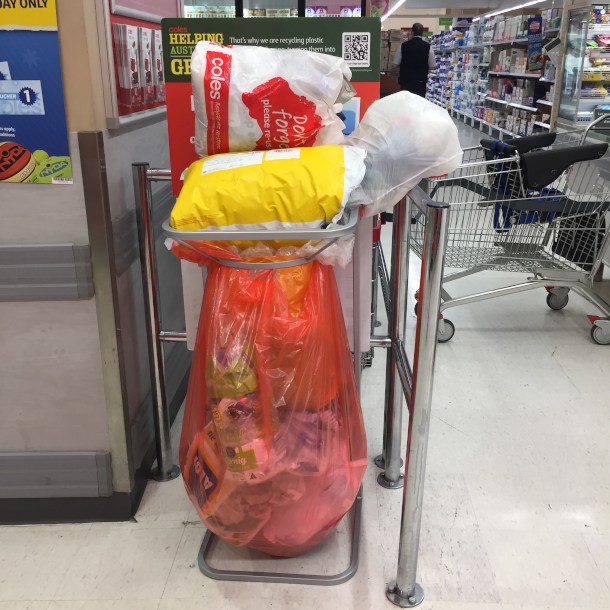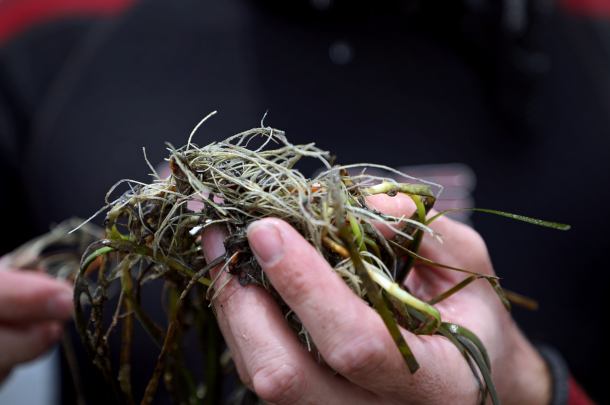Beyond the Headlines
Air Date: Week of November 13, 2020

New Jersey is banning single use plastic bags as well as polluting products like foam food products and clam shell takeout boxes. (Photo: Gill King, Flickr, CC BY SA 2.0)
In this week's Beyond the Headlines, Environmental Health News Editor Peter Dykstra and Host Bobby Bascomb cover a sweeping ban on single use plastic bags in the State of New Jersey. They continue their conversation with a successful seagrass restoration project in Virginia. And they look back 70 years to the installation of the 14th Dalai Lama, who has advocated strongly for peace and a healthy environment.
Transcript
CURWOOD: It’s Living on Earth, I’m Steve Curwood
BASCOMB: And I’m Bobby Bascomb.
It's time now for a look Beyond the Headlines with Peter Dykstra. Peter is an editor with environmental health news that's ehn.org and dailyclimate.org. Hey there, Peter, what do you have for us this week?
DYKSTRA: Well, hi Bobby, we're gonna start with a trip back to my beloved ancestral home New Jersey. Last week, Governor Phil Murphy signed the most sweeping restrictions on single use plastic bags, in grocery stores and other retail establishments, plastic bags are going to be phased out by May of 2022.
BASCOMB: Wow, that's amazing. Some 10 million people live in New Jersey, right? That's a big market.
DYKSTRA: Yeah, and that kind of thing. Even more so when a much bigger state like California makes the switch is that manufacturers and retailers tend to put a lot of weight on the new standards, because they don't want to have to manufacture and behave and distribute in two different ways. When the big states tend to be more restrictive they go from resisting that to supporting it. Let's see if that happens with New Jersey. First offense for a merchant is a warning. Once you get up to strike three on plastic bag violations it's gonna be a $5,000 fine.
BASCOMB: Wow, that'll add right up. And of course, New Jersey gave some early warning signs of the plastic crisis back in the 1980s. With all the medical waste washing up on the beaches there.
DYKSTRA: Yeah, medical waste on the beaches in New Jersey along with the sewage spills on beaches, were one of the real warning signs that gave a boost to the environmental movement, resulting in the big Earth Day celebration in 1990. But Jersey, led the way in a bad way with this plastic bag ban maybe it's going to be leading the way in a good way.
BASCOMB: Well, we can hope. What else do you have for us this week?

Virginia seagrass restoration projects have helped grow 9,000 acres of critical eelgrass habitat. (Photo: AJ Johnson, Flickr, CC BY SA 2.0)
DYKSTRA: We'll go a little bit South of Jersey to the Virginia coastline. There's been a project underway for 20 years to restore seagrass. Seagrass around the world in estuaries long coastlines is valuable habitat, from everything from sharks, to juvenile fish, to sea horses. And in the 1930s, there was a pandemic that wiped out a lot of the seagrass areas along coastlines around the world. Some of them eventually recovered. Virginia and other areas never did. But this project that's been underway for two decades, involves seeding 500 acres with new sea grass. That was a success but the bigger success went to Mother Nature herself, because those 500 acres of newly planted seagrass spread to 9,000 acres because nature did what nature does. It's a small success in the global picture, but it's one that's being used as a model for what can help restore seagrass ecology all around the world.
BASCOMB: A small example but I mean, it is nice to be reminded of the fact that nature wants to heal itself, you know, we just have to sort of give it a nudge in the right direction, if possible,
DYKSTRA: Right and policy and tax dollars, helping to give that nudge in the right direction, also is a contributor to reversing some of our biggest challenges.
BASCOMB: That's for sure. Well what do you have for us from the history books this week?
DYKSTRA: Go back to November 10th 1950, 70 years ago Tenzin Gyatso, a 15 year old Tibetan boy was installed as the 14th Dalai Lama. That's 70 years as a leader for peace and a healthy environment. He's spoken out so frequently on climate change and environment. He also has a heck of a sense of humor, if you ever hear him speak.

The Dalai Lama has served for 70 years and has spoken about protecting the environment. (Photo: National Institutes of Health, Flickr, CC BY SA 2.0)
BASCOMB: All right. Well, thanks, Peter. Peter Dykstra is an editor with environmental health news. That's ehn.org and dailyclimate.org. And we'll talk to you again real soon.
DYKSTRA: Okay, Bobby, thanks a lot. Talk to you soon.
BASCOMB: And there's more on these stories on the Living on Earth website. That's loe.org.
Links
Changing America | “‘New Jersey Signs Strongest Paper and Bag Ban in the US”
Bulletin of the Atomic Scientist | “‘Seagrass Meadows”
The Quint | “‘Dalai Lama, an Environmentalist: A Commitment of 70 Years”
Living on Earth wants to hear from you!
Living on Earth
62 Calef Highway, Suite 212
Lee, NH 03861
Telephone: 617-287-4121
E-mail: comments@loe.org
Newsletter [Click here]
Donate to Living on Earth!
Living on Earth is an independent media program and relies entirely on contributions from listeners and institutions supporting public service. Please donate now to preserve an independent environmental voice.
NewsletterLiving on Earth offers a weekly delivery of the show's rundown to your mailbox. Sign up for our newsletter today!
 Sailors For The Sea: Be the change you want to sea.
Sailors For The Sea: Be the change you want to sea.
 The Grantham Foundation for the Protection of the Environment: Committed to protecting and improving the health of the global environment.
The Grantham Foundation for the Protection of the Environment: Committed to protecting and improving the health of the global environment.
 Contribute to Living on Earth and receive, as our gift to you, an archival print of one of Mark Seth Lender's extraordinary wildlife photographs. Follow the link to see Mark's current collection of photographs.
Contribute to Living on Earth and receive, as our gift to you, an archival print of one of Mark Seth Lender's extraordinary wildlife photographs. Follow the link to see Mark's current collection of photographs.
 Buy a signed copy of Mark Seth Lender's book Smeagull the Seagull & support Living on Earth
Buy a signed copy of Mark Seth Lender's book Smeagull the Seagull & support Living on Earth

